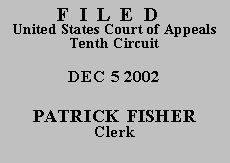

| UNITED STATES OF AMERICA,
Plaintiff -Appellee, v. MILTON BEASLEY, |
No. 02-1203 |
I. BACKGROUND
Milton Beasley, a federal prisoner proceeding pro se, requests 1) a
certificate of appealability (a "COA") to appeal the denial of his 28 U.S.C. § 2255 habeas petition and 2) authorization to proceed in forma pauperis ("IFP"). For the reasons stated below, we deny a COA, deny IFP status, and dismiss the appeal.
Mr. Beasley pleaded guilty to a charge that he conspired to possess more than fifty grams of cocaine with intent to distribute in violation of 21 U.S.C. § 846. He subsequently moved to withdraw the plea, arguing that his attorney had provided ineffective assistance of counsel. The district court denied the motion, conducted sentencing proceedings, and sentenced Mr. Beasley to a 360-month term of imprisonment.
On direct appeal to this court, Mr. Beasley argued that the district court erred in denying his motion to withdraw his plea. We affirmed the district court's decision denying Mr. Beasley's motion to withdraw the plea. See United States v. Beasley, No. 97-1104, 1998 WL 688882 (10th Cir. Feb. 20, 1998). Subsequently, Mr. Beasley filed a petition for a writ of habeas corpus under 28 U.S.C. § 2255, which the district court denied.
II. DISCUSSION
Mr. Beasley may only receive a COA if he "has made a substantial showing
of the denial of a constitutional right." 28 U.S.C. § 2253(c). To make this showing, Mr. Beasley must demonstrate that the issues are debatable among jurists, that a court could resolve the issues differently, or that the questions presented deserve further proceedings. See Slack v. McDaniel, 529 U.S. 473, 483-84 (2000). Given Mr. Beasley's pro se status, we construe his contentions liberally. See Haines v. Kerner, 404 U.S. 519, 520-21 (1972).
Liberally construing Mr. Beasley's pleadings, he contends that (1) his sentence violated his constitutional due process rights; (2) his sentence violated his constitutional right to confrontation; (3) his plea bargain violated his constitutional equal protection requirements; (4) the operation of the sentencing guidelines against him violated his right to confrontation and due process rights; (5) he received ineffective trial counsel; (6) the application of the sentencing guidelines violated his constitutional rights under Apprendi v. New Jersey, 530 U.S. 466 (2000); and that (7) he received ineffective assistance of appellate counsel for failure to raise the previous six grounds on direct appeal.
"When a defendant alleges his appellate counsel rendered ineffective assistance by failing to raise an issue on appeal, we examine the merits of the omitted issues." United States v. Cook, 45 F.3d 388, 392 (10th Cir. 1995) (internal quotation marks and citation omitted). "If the omitted issues are without merit, counsel's failure to raise it does not constitute constitutionally ineffective assistance of counsel." Id.
The district court's order denying the § 2255 motion recognized that issues not raised on direct appeal are procedurally defaulted and therefore barred absent a showing of cause and prejudice. However, evidently construing Mr. Beasley's petition to be arguing that his ineffective assistance of counsel claim constituted cause and prejudice that excused the default, the district court considered the merits of the claims that Mr. Beasley raised in conjunction with his ineffective assistance of appellate counsel claim. See Aplt's App. 1, at 6-9 (Dist. Ct. Order, filed Mar. 27, 2002). To show ineffective assistance of counsel, Mr. Beasley must show, among other things, prejudice flowing from deficient representation, that is, that "there is a reasonable possibility that, but for counsel's professional error, the result of the proceeding would have been different." Strickland v. United States, 466 U.S. 688, 694 (1984). Applying these criteria by assessing the merits of the claims raised in conjunction with Mr. Beasley's ineffective assistance of counsel claim, the district court determined that Mr. Beasley failed to show constitutionally deficient performance by his appellate counsel, and that there was no prejudice from appellate counsel's failure to raise the other issues alleged. See Aplt's App. 1, at 7.
In reviewing the district court's denial of Mr. Beasley's § 2255 motion, we review its legal rulings de novo and factual findings for clear error. See United States v. Kennedy, 225 F.3d 1187, 1193 (10th Cir. 2000), cert. denied, 532 U.S. 943 (2001). Ineffective assistance of counsel claims involve mixed questions of law and fact which we review de novo. See United States v. Prows, 118 F.3d 686, 691 (10th Cir. 1997).
With these standards of review in mind, we have conducted a thorough review of the pleadings and entire record on appeal. For the purpose of judicial economy, we decline to duplicate the district court's clear and comprehensive analysis of the claims raised in Mr. Beasley's § 2255 motion. For substantially the same reasons as those discussed by the district court, we conclude that the district court's disposition of Mr. Beasley's habeas petition was correct.
III. CONCLUSION
For the foregoing reasons, we DENY Mr. Beasley's request for a COA,
DENY his request to proceed IFP, and DISMISS the appeal.
Entered for the Court,
Robert H. Henry
Circuit Judge
*.This order and judgment is not binding precedent, except under the doctrines of law of the case, res judicata, and collateral estoppel. The court generally disfavors the citation of orders and judgments; nevertheless, an order and judgment may be cited under the terms and conditions of 10th Cir. R. 36.3.